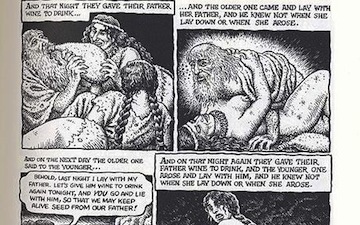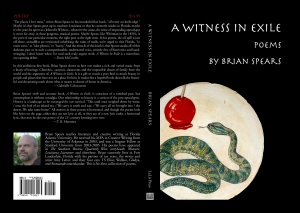Murder, Sex, Lies and Incest... in the Bible?
Travis Griffith
As many people might know, I am reading the Bible for the first time and blogging about it here.
The people who are joining me as I read might expect, or maybe even hope for, a certain response. I imagine that's especially true for veteran Bible readers and scholars. Should my response not be what is expected, some people might become defensive and write me off a as a clueless lunatic. Or worse.
My intent is not to trash this book or point out any self-perceived flaws I think it might contain. The reason I chose to embark on this reading is to invoke provocative thought; from myself, from those reading at the same time and from those who have read the book in the past. My intent is to find poetic beauty that resonates within my spirit. To debate, discuss and challenge long-established truths, then dig deeper and find new meaning.
In the first hundred pages or so of Genesis, I'm disappointed. If this were a book I picked up by a new author I wouldn't continue reading. I opened the pages of this particular tome thirsty for beauty and got a mouthful of dust.
Followed by a roundhouse kick to the face.
I'm amused by the account of creation but have a hard time believing that modern humans accept the story of Earth and all life it holds being created within six days. Yes, it's a nice verse that may have convinced people eons ago but today we have science to tell us that the Sun was around well before the Earth and that evolution of the species is a very real concept happening against a well-established timeline.
Where do Adam and Eve fall on that timeline? How many years ago did they take from the tree of knowledge and open their eyes to sin?
The story of Noah holds equal fascination. Why God would create life then decide he screwed up, wipe it away then repopulate with the same species just doesn't make any sense. Then again, making sense and having faith are very different things so maybe there's a deeper meaning here that I am missing. If so, I'd be more than happy to read the section again with a different set of eyes.
The fact that these early human lives spanned 800-900 years doesn't do much for the credibility factor either.
It was the story of Abraham and his descendants, though, that truly disturbed me and opened the floodgates of rhetorical questions.
I read with wide eyes when Abraham shared his wife with other men. I uttered an audible "What?" just below my breath when Jacob took two wives, both of whom let him have sex with other women.
I guess I was under the impression the Bible was against infidelity, but then again I'm early in the story so I'll withhold judgment until later.
My stomach turned in disgust when the two daughters had sex with their father in attempts to get pregnant and felt mortified when Lot offered his daughters in an attempt to stop men from having sex with each other in the city of Sodom.
In that part of the world, in that time period, was forced sex upon females more acceptable than consensual sex between males? I didn't expect this.
It's a moot point, I suppose, because God killed the entire town of men with sulfuric fire rain anyway. (Which sounds more like the devil's work than God's.)
Honestly, I was really nervous to write the post a few weeks ago about pornography, but that's downright tame compared to what I've read in the Bible so far.
However uncomfortable it might be to acknowledge, in these first few chapters, God has committed mass murder (multiple times), feels like he screwed up humanity from the very beginning of creation and seems to condone multiple sexual partners while married.
Wow. This is quite the opening to the story of Christianity.
Maybe the point of Genesis is to establish the point that humans naturally lust for what has been called "sin." To ingrain an immediate fear of a vengeful God. To paint humanity as a disgusting cesspool of lawless evil before being saved by the time the last page is turned.
I hope not. I hope God would instead describe humans as his masterpiece; beings of light capable of experiencing the kind of love he used to create the universe.
Now that I've started this, I'm 100 percent convinced I need support and guidance. Reading Stephen Swanson's advice should really help, along with all the great comments and support posted when this project was announced. I hope (and pray, I guess) that the support continues.
Remember, this truly is the first time I've ever cracked open the spine of a Bible with the intent of reading it with a completely open mind. I was punched in the face with these taboo topics and am left wondering if folks just choose not to discuss this stuff in polite company, haven't noticed it, or just take it all with the same grain of salt I took with the story of a 6-day creation.
I have many, many other questions written down from my reading so far, but I'll end with just one:
Are there any other first-time Bible readers on this journey with me?
***
Travis Griffith, Relief's Blog Manager, is a former atheist now exploring what a spiritual life really means. His children’s book, Your Father Forever, was published in 2005 by Illumination Arts Publishing Company, Inc. Travis works from his home in Spokane, WA as a professional writer.










